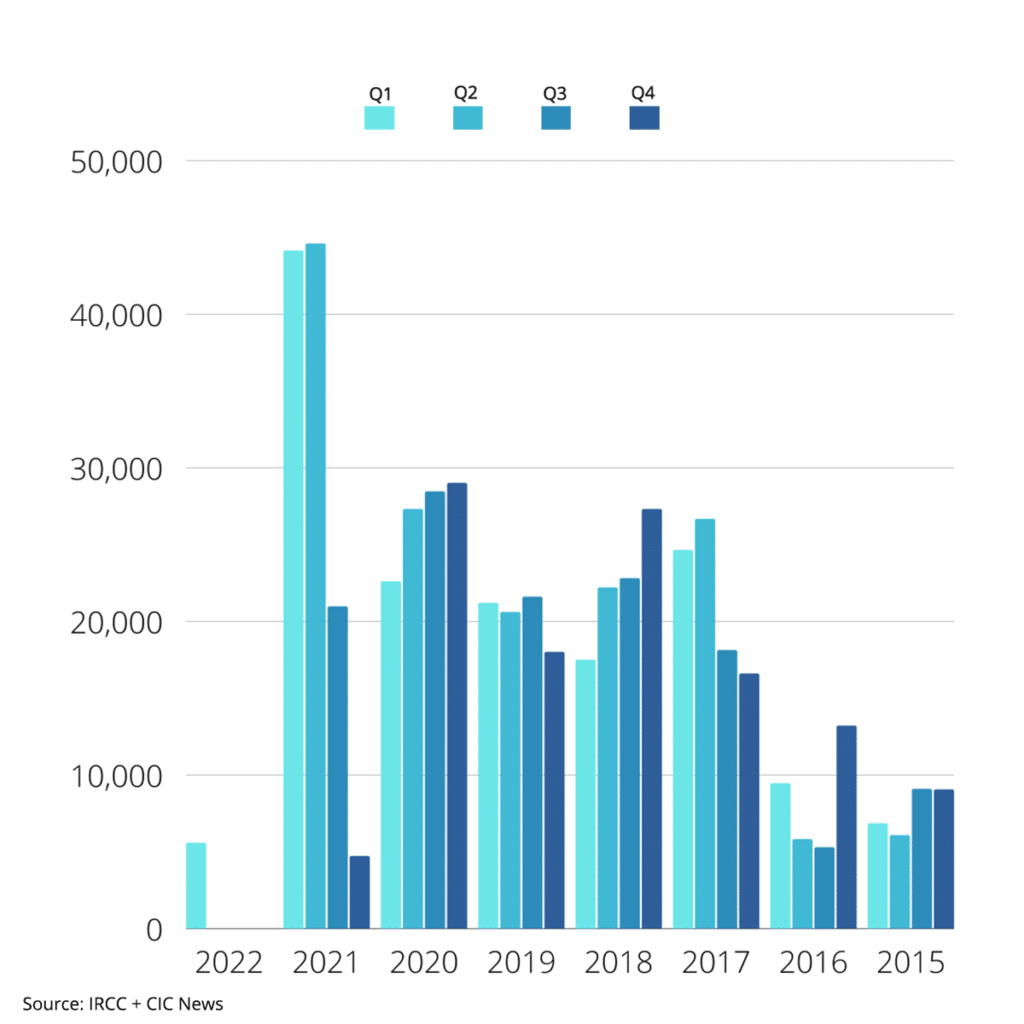Canada has been playing catch-up this past quarter, resulting in a relatively slow start to the year for Express Entry.
Immigration, Refugees and Citizenship Canada (IRCC) has so far invited only 6,470 Express Entry candidates to apply, all of whom are Provincial Nominee Program (PNP) candidates. Compared to previous first quarters, the start of 2022 has been the smallest first quarter since Express Entry was launched in 2015. The smallest quarter ever was Q4 2021, when Canada invited just 4,735 PNP candidates to apply for permanent residence.
The first seven draws of 2022 have consisted of record-breaking PNP draws. The largest PNP draw ever was held on February 16 when 1,082 candidates were issued Invitations to Apply (ITAs).
Get a Free Express Entry Assessment
Express Entry invitations by quarter

Why so few Express Entry invitations
The drop in invitations overall is the result of a backlog in Express Entry applications for permanent residence. IRCC halted draws for Canadian Experience Class (CEC) candidates in September 2021, as the backlog in applications had driven up expected processing times in excess of the six-month standard. FSWP candidates had not had a draw for nearly a year at that point, as IRCC paused draws for these candidates in December 2020.
Before the pandemic, most Express Entry draws were not program specific. Candidates from any Express Entry-managed program, including the Federal Skilled Worker Program (FSWP), Federal Skilled Trades Program (FSTP), CEC and PNP, could receive an invitation so long as their Comprehensive Ranking System (CRS) score was high enough. Occasionally, IRCC would hold FSTP-specific draws to allow for more trades candidates to be invited to apply. There were only a few PNP and CEC-only draws prior to 2020.
Canada closed its border to most international travel in March 2020. At the same time, IRCC operations all around the world came to a halt. Even so, IRCC continued to hold Express Entry draws. For the first few months after the border closed, IRCC only invited CEC and PNP candidates, then briefly resumed draws for FSWP candidates between August and December 2020.
Internal IRCC communications indicate the backlog was exacerbated because Canada focused on transitioning as many temporary residents to permanent residents as possible. IRCC created the Temporary Residence to Permanent Residence (TR2PR) immigration program, and invited record numbers of CEC candidates. The backlog for FSWP candidates grew so much that the estimated processing times for this program is expected to reach 36 months in 2022, even though the IRCC website still indicates that these applications will be processed in six months.
IRCC has paused draws in order to process the backlog and return estimated processing times to the standard. No new invitations to apply means no applications are coming in, and the department can focus on clearing the backlog. There are enough Express Entry applicants waiting to be processed to fill the immigration targets for 2022.
Express Entry forecast
Although Immigration Minister Sean Fraser has not confirmed any date for when Express Entry draws for skilled workers will resume, he has suggested it could be as early as the spring.
The most recent IRCC inventory data shows that between February 28 and March 15, IRCC processed 4,101 FSWP applicants, which is more than IRCC processed in a seven-month period in 2021. Canada has already landed more FSWP immigrants in 2022 than it did in all of last year. There are about 41,000 FSWP applicants left to be processed as of mid March.
According to the same backlog data, there are about 10,400 CEC applicants left to be processed. In 42 days, IRCC was able to process 4,751 CEC applicants. At this rate, IRCC could end the CEC backlog by this spring.

